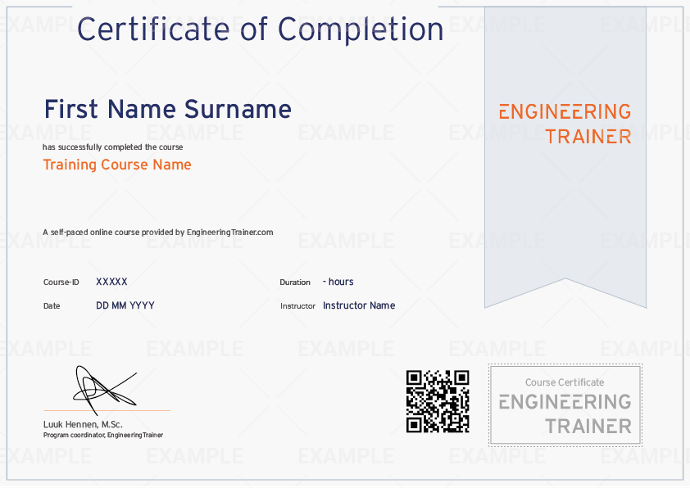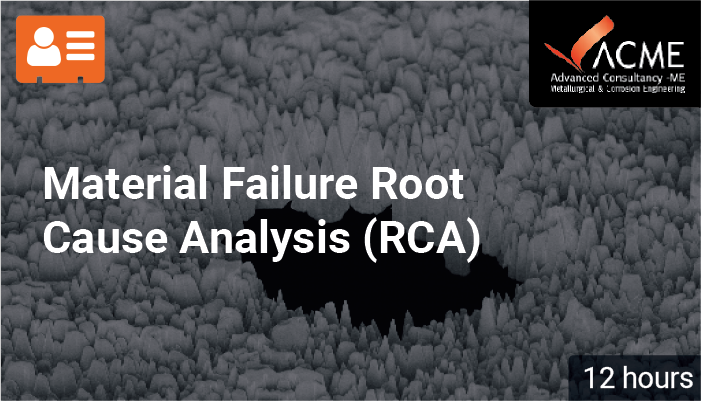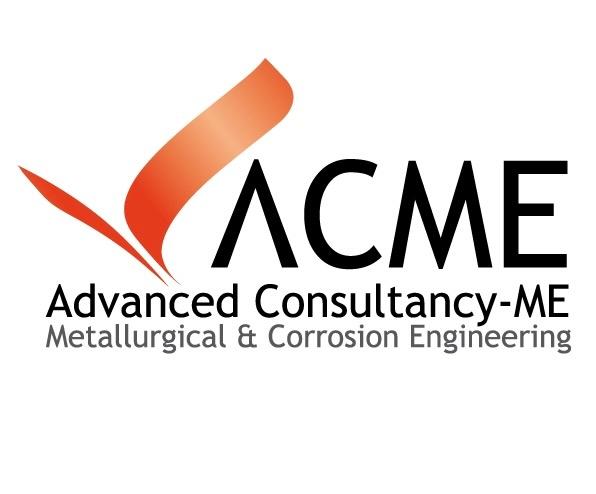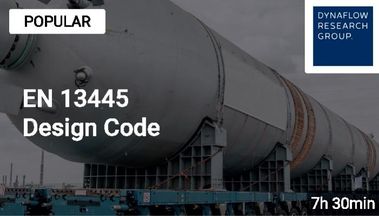Material Failure Root Cause Analysis (RCA)
Join the Program
Virtual or Classroom
12 hr Content
2 Day program
Registration deadline: 15 July 2024
Custom Scheduling
Mimoun Elboujdaini
INCO3106
Format:
Instructor-led
Join the Program
To register multiple team-members at once, use the link below.
Need a dedicated version of this program for your team? Please contact us.
Course Objective
“Participants will be provided with the essential knowledge and skills necessary for developing a material failure root cause analysis (RCA) approach for material failure diagnosis.”
Private course for team
Custom scheduling
Industry Expert
On-site or virtual
1-year unlimited access
to up-to-date course materials
PDH Hours qualified course
Read more here
About the course
In-Company
Live sessions
12 hr Content
Custom
English
INCO3106
Material failure root cause analysis (RCA) is a systematic approach used to identify and analyze the underlying causes of material failures. It involves investigating the failure mechanisms, examining the materials, analyzing the operating conditions, and identifying contributing factors to determine the root cause(s) of the failure. RCA is essential in understanding why a material or component failed and implementing corrective actions to prevent future failures.
This root cause analysis (RCA) course provides participants with a comprehensive understanding of the RCA process for investigating and analyzing material failures. The course covers key concepts, methodologies, and tools, such as SEM-EDS and Focus Ion Beam (FIB), used to identify the root causes of failures and develop effective corrective actions. Participants will gain practical skills in conducting RCA, enhancing their ability to improve material performance, prevent future failures, and enhance safety and reliability.
The course consists of 12 hours of live sessions with the instructor. All training content is provided through your EngineeringTrainer account.
After the course, you maintain 1-year unlimited access to the course, including any new course material. This allows you to perform modules again should you need to refresh your knowledge.
Questions? Contact us
hello@engineeringtrainer.com
+31 (0)85 058 0051
Monday - Friday, 9am - 6pm CEST

Meet your instructor
Program & Details
To prevent failures, reduce costs, enhance safety, and improve quality.
By understanding and addressing the root causes of material failures, organizations can achieve higher levels of reliability, efficiency, and customer satisfaction.
What is Root Cause Analysis (RCA)
Data Collection - Assessment
How to Perform Root Cause Analysis (RCA)
Corrosion failure
Forms of Corrosion
Overview of the method
Application in RCA of material failure
Overview of the method
Application in RCA of material failure
Overview of the method
Application in RCA of material failure
New construction or replacement materials
Specification of HIC‐resistant steel
Avoidance of HIC-New linepipe.
Recommended specification for hydrogen embrittlement linepipe.
Overview of the method
Application in RCA of material failure
Overview of the method
Application in RCA of material failure
Overview of the method
Application in RCA of material failure
Results
After this course, you...
can take a leading role in a Root Cause Analysis for a material failure; determining the work flow and the necessary assessment steps
will understand the options available to analyze and address different mechanical failures
know the principles of Optical Microscopy, Stereomicroscopy, Fluorescence Microscopy and Comparison Microscopy, and when these are most applicable for a Root Cause Analysis
know the principles of Scanning Electron Microscopy and Focus Ion Beam, and when these are most applicable for a Root Cause Analysis
understand how root cause analysis can be used to, enhance safety, improve quality, achieve regulatory compliance and manage risks effectively
be able to contribute to the improvement of system reliability, and make informed decisions to prevent future failures.
Who should attend this course
The course is beneficial for a wide range of professionals across various industries looking to understand how to apply Root Cause Analysis for material failures and monitoring, including:
Quality control personnel
Engineers
Maintenance and Reliability professionals
Project Managers
Risk and Compliance professionals
Prerequisites:
There are no specific prerequisites for this training course.
Level: Intermediate
Live sessions
This course consists of instructor-led group sessions, these group sessions can be Virtual or Onsite. During these sessions participants can ask questions to the instructor which are discussed, as well as questions submitted beforehand in the learning portal.
After each live session used slides and exercise documents are made available to participants on the learning portal. Please note that for privacy reasons no recordings of the live sessions are made or provided. You receive 1-year unlimited access to the online course material. This allows you to watch content again if this is beneficial for your daily work activities and benefit from any material updates.
The live sessions are scheduled together with the customer and are private for their team only.
Typically the training course would be scheduled as:
Virtual: 4 sessions of 3 hours each
Onsite: 2 days of 6 hours
After the course participants receive 1-year unlimited access to the slides and exercise documents used within the sessions via the learning portal. This allows them to review material when required to refresh their knowledge for daily work activities.
A personal digital certificate will be made available to each participant upon full attendance.
Example Certificate:

FAQ
This course consists of instructor-led live sessions which consist of presentations, demonstrations and discussions of questions. During each live session participants can ask questions to the instructor (through chat or microphone) which will be answered.
Please note that for privacy reasons no recordings of the live sessions are made or provided.
The training material used in the live sessions, for example the slides or exercises, will be available in the EngineeringTrainer portal for a year after the date of the training allowing you to refresh your knowledge or review material if needed.
No, course content is not available for download.
The training material used in the sessions, for example the slides or exercises, will be available in the EngineeringTrainer portal for a year after the date of the training allowing you to refresh your knowledge or review material if needed.
Please note that for privacy reasons no recordings of the live sessions are made or provided.
Yes, interactive Q&A sessions are part of the live sessions in this course and allow you to interact with the instructor and ask questions.
To respect the privacy of the participants the live sessions will not be recorded, and as such the live sessions cannot be played back. Therefore it is important for all participants to block the time slots of the live sessions in their calendars and be present.
No software licenses are provided as part of this course.
Yes, this course qualifies for PDH hours as per the NCEES CPC Guidelines.
Related Courses

Virtual or Classroom upon request
Industrial Automation System Architecture and OT Cybersecurity






